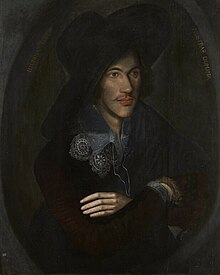The Passionate Shepherd to His Love


"The Passionate Shepherd to His Love" est carmen breve a Christophoro Marlowe scriptum annoque 1599 divulgatum, cui responsa confecerunt anno 1600 Gualtherus Raleigh, titulo "The Nymph's Reply to the Shepherd", atque mox Iohannes Donne, titulo "The Bait". Quae carmina tria Isaacius Walton in opere suo The Compleat Angler anno 1655 citavit.
Carmen amoris pastoralis Marlovianum ita incipit:
- Come live with me and be my love,
- And we will all the pleasures prove
- That hills and valleys, dale and field,
- And all the craggy mountains yield ...
- There I will make thee beds of roses
- And a thousand fragrant posies,
- A cap of flowers, and a kirtle
- Embroider'd all with leaves of myrtle ...
Cui puella pessimista Raleghana respondet:
- If all the world and love were young,
- And truth in every shepherd's tongue,
- These pretty pleasures might me move
- To live with thee and be thy love ...
- Thy gowns, thy shoes, thy beds of roses,
- Thy cap, thy kirtle, and thy posies
- Soon break, soon wither, soon forgotten, -
- In folly ripe, in reason rotten ...
Iuvenis igitur ab Ioanne Donne depictus voluptates novas profert. Hic textus, sicut dicit Isaacius Walton, est "a copy of verses that were made by Doctor Donne, and made to show the world that he could make soft and smooth verses, when he thought fit and worth his labour."
- Come live with me, and be my love,
- And we will some new pleasures prove
- Of golden sands, and crystal brooks,
- With silken lines and silver hooks.
- There will the river whisp'ring run
- Warm'd by thy eyes, more than the sun ...
- When thou wilt swim in that live bath,
- Each fish, which every channel hath,
- Will amorously to thee swim,
- Gladder to catch thee, than thou him.
- If thou, to be so seen, be'st loth,
- By sun or moon, thou dark'nest both,
- And if myself have leave to see,
- I need not their light, having thee ...
Nexus externi
[recensere | fontem recensere]- Textus Marlowe, Raleigh et Donne apud Vicifontem Anglicam
|
Ludi scaenici: Dido Queen of Carthage · Tamburlaine · The Jew of Malta · Doctor Faustus · Edward II · The Massacre at Paris | |


